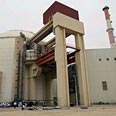
The head of Iran's nuclear power agency said Sunday the country is willing to help neighboring Arab countries build joint light-water nuclear power plants if they are interested.
There was no immediate reaction from Arab countries, many of whom are deeply suspicious of the Islamic Republic's intentions regarding its controversial nuclear program.
Several Arab countries have announced plans to develop their own civilian nuclear programs for electricity generation in recent years, motivated in part by a feeling they need to keep up with Iran to blunt its growing regional influence.
It was unclear why Iran made the offer to help, but it may be trying to allay neighbors' concerns.
Gholam Reza Aghazadeh, the head of the Atomic Energy Organization of Iran, said the country was ready to offer the proposal for joint plants, according to a report carried Sunday by IRNA, the country's official news agency.
The US and some of its allies claim Iran is secretly seeking to develop nuclear weapons, but Iran says its nuclear program is for civilian and peaceful uses only to generate power.
Desire for energy independence
Iran is building its first nuclear power plant with Russia's help. It is slated to open in 2009.
At least 13 Middle Eastern countries either announced new plans to explore nuclear energy or revived pre-existing nuclear programs between February 2006 and January 2007, the London-based International Institute for Strategic Studies said in a report this summer.
The report noted that most of the programs are still immature, and that sustainable new reactor projects in the Middle East are at least 10 or 15 years away.
Countries such as Jordan, Morocco or Tunisia have comparatively few energy reserves and are spurred on at least in part by a desire for energy independence in an age of soaring oil prices.
On the other hand, oil-rich Saudi Arabia, a longtime rival of Shiite Iran, is probably largely driven by the need to maintain its edge as a regional power, the report said.
Still other countries, such as Egypt or Turkey, are likely motivated both by worry over high energy prices and wariness of Iran.
Turkey said in 2006 that it wanted to produce 5,000 megawatts of nuclear energy by 2015, the same year that Egypt announced that its first reactor would be built at El-Dabaa, on the Mediterranean coast.
In addition, Syria last year was the target of an Israeli raid allegedly aimed at destroying a covert nuclear weapons program there.















